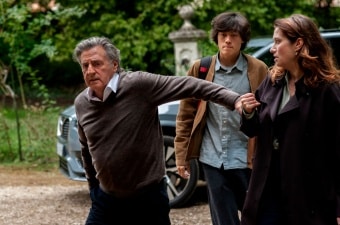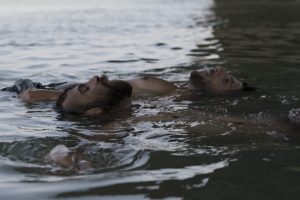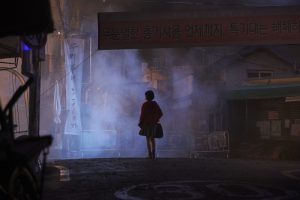The San Sebastian Film Festival is Spain’s only A-list event running from 22 September until 30th in the North West Spanish town on the shores of the Atlantic, and often known by its Basque name of Donostia. This year celebrating its 71st edition, a selection of Spanish titles and international fare competes for the Golden Shell Award in venues such as the Kursaal and the Victoria Eugenia theatre. This year’s edition, honouring Victor Erice, and headed by Claire Denis as president of the Golden Shell jury, kicks off withThe Boy and The Heron and closes with James Marsh’s Dance First starring Gabriel Byrne.
THE BOY AND THE HERON – Hayao Miyazaki
A young boy named Mahito yearning for his mother ventures into a world shared by the living and the dead. There, death comes to an end, and life finds a new beginning. A semi-autobiographical fantasy about life, death and creation, in tribute to friendship, from the mind of Hayao Miyazaki. Out of competition
DANCE FIRST – James Marsh
Literary genius Samuel Beckett lived a life of many parts: Parisian bon vivant, WWII Resistance fighter, Nobel Prize-winning playwright, philandering husband, recluse. But despite all the adulation that came his, way he was a man acutely aware of his own failings. Titled after Beckett’s famous ethos “Dance first, think later,” the film is a sweeping account of the life of this 20th-century icon. Out of Competition
Competition films
ALL DIRT ROADS TASTE OF SALT – Raven Jackson
A lyrical decades spanning exploration across a woman’s life in Mississippi, this feature debut from award-winning poet, photographer and filmmaker Raven Jackson is a haunting and richly layered ode to the generations of people that hail from the region.
A JOURNEY IN SPRING – Tzu-Hui Peng, Ping-Wen Wang
An old man with a limp, Khim-Hok, has depended on his wife over the years. They live in an old house on the urban fringe of Taipei. After his wife suddenly passes away, the man puts her into an old freezer and carries on as normal. But his long lost son and partner suddenly appears leaving Kim-Hok to face his demons.

SULTANA’S DREAM – Isabel Herguera
Taking her inspiration from a feminist sci-fi short story written in Bengal in 1905, Ines sets out on a voyage of discovery around India in search of Ladyland, the Utopian land of women.
EX-HUSBANDS – Noah Pritzker
Peter’s parents divorced after 65 years, his wife left him after 35, and his sons, Nick and Mickey, are off leading their own lives. When Peter flies to Tulum, crashing Nick’s bachelor party hosted by Mickey, he realizes he’s not the only one in crisis.
FINGERNAILS – Christos Nikos
Anna and Ryan have found true love. It’s been proven by a controversial new technology. There’s just one problem: Anna still isn’t sure. Then she takes a position at a love testing institute, and meets Amir.
GREAT ABSENCE – Key Chika-Ura
Anna and Ryan have found true love. It’s been proven by a controversial new technology. There’s just one problem: Anna still isn’t sure. Then she takes a position at a love testing institute, and meets Amir.
KALAK – Isabella Eklof
Jan is on the run from himself after being sexually abused by his father. Living in Greenland with his little family, he yearns to be a part of the open, collectivist culture and become a Kalak, a “dirty Greenlander”.

RED ISLAND – Robin Campillo
L’île rouge / Red Island is set in Madagascar in the early 1970s, on one of the last air bases of the French army, where military families live the last throes of colonialism. Influenced by his reading of the intrepid comic book heroine Fantômette, ten-year-old Thomas sweeps with a curious glance what surrounds him, while the world gradually opens up to a different reality.
THE PRACTICE – Martin Rejtman
Gustavo and Vanessa separate and have to redraft their projects together. Both are yoga teachers. Gustavo is Argentinian, Vanessa is Chilean. The trip to India is cancelled. Vanessa keeps the apartment and leaves the studio they shared, making Gustavo homeless. As a result of the accumulated stress, Gustavo injures his knee and replaces yoga: first with quadriceps exercises and then with the gym. But gradually he gets his life back on track and starts practising again.
THE GREAT TEMPTATION – Xavier Legrand
Ellias Barnès, 30, is the newly-announced artistic director of a famous Parisian fashion house. But as expectations are high, he starts experiencing chest pain. Out of the blue he is called back to Montreal to organise his estranged father’s funeral and discovers that he may have inherited much worse than his father’s weak heart.
THE SUCCESSOR – Xavier LeGrand
Ellias Barnès, 30, is the newly-announced artistic director of a famous Parisian fashion house. But as expectations are high, he starts experiencing chest pain. Out of the blue he is called back to Montreal to organise his estranged father’s funeral and discovers that he may have inherited much worse than his father’s weak heart.
MMXX – Christi Pui
Oana Pfifer, a young therapist, gradually slips into the net of the questionnaire she submits to her patient. Mihai, Oana’s brother, worrying about his birthday, is stuck in a story far bigger than he can handle. Septimiu, Oana’s husband, concerned about his health, vaguely listens to a strange story his colleague was caught up in a while ago. Narcis Patranescu, an organized crime detective, deals with an unsettling dark story while interrogating a young woman at a funeral.
THE RYE HORN – Jaione Camborda
Illa de Arousa, 1971. Maria is a woman who earns a living harvesting shellfish. She is also known on the island for helping other women in childbirth with special dedication and care. After an unexpected event, she is forced to flee and sets out on a dangerous journey that will make her fight for her survival. Seeking her freedom, Maria decides to cross the border by one of the smugglers’ routes between Galicia and Portugal.
PUAN – Benjamin Naishtat, Maria Alche
Illa de Arousa, 1971. Maria is a woman who earns a living harvesting shellfish. She is also known on the island for helping other women in childbirth with special dedication and care. After an unexpected event, she is forced to flee and sets out on a dangerous journey that will make her fight for her survival. Seeking her freedom, Maria decides to cross the border by one of the smugglers’ routes between Galicia and Portugal.
THE ROYAL HOTEL – Kitty Green
Illa de Arousa, 1971. Maria is a woman who earns a living harvesting shellfish. She is also known on the island for helping other women in childbirth with special dedication and care. After an unexpected event, she is forced to flee and sets out on a dangerous journey that will make her fight for her survival. Seeking her freedom, Maria decides to cross the border by one of the smugglers’ routes between Galicia and Portugal.
UN AMOR – Isabel Coixet
Having escaped from her stressful life in the city, 30-year-old Nat holes up in the small village of La Escapa, in deepest rural Spain. In a rundown country house, with a crochety stray dog, the young girl will try to put her life back on track. Having dealt with her landlord’s hostility and the mistrust of the village locals, Nat finds herself accepting a disturbing sexual proposal made by her neighbour Andreas. This strange and confusing encounter will give rise to an all-consuming and obsessive passion that will completely engulf Nat and make her question the kind of woman she thinks she is.

A SILENCE – JOACHIM LAFOSSE
Astrid is the wife of an acclaimed lawyer. Silenced for 25 years, her family balance suddenly collapses when her children initiate their search for justice.
Special Screenings
THEY SHOT THE PIANO PLAYER – Fernando Trueba, Javier Mariscal
A music journalist from New York sets out on a frantic investigation into the mysterious disappearance of Brazilian pianist Tenorio Jr, regular accompanist of Vinicius de Moraes, among others. This animated thriller moving to the beat of jazz and bossa nova portrays the days immediately before the Latin American continent was enshrouded by totalitarian regimes.

A PROPER JOB – Thomas Lilti
It’s a new school year. Benjamin is a PhD student without a grant. Given his lack of future prospects, he accepts a position as a contract teacher in a Parisian middle school. Without training or experience, he soon realises just how tough the teaching profession can be in an education system crippled by a chronic lack of resources. With the support and commitment of the other teachers, and a bit of luck, he will reconsider his vocation.
SAN SEBASTIAN FILM FESTIVAL | 2023







 EL AMOR MENOS PENSADO
EL AMOR MENOS PENSADO ANGELO
ANGELO DER UNSCHULDIGE / THE INNOCENT
DER UNSCHULDIGE / THE INNOCENT EL REINO
EL REINO ENTRE DOS AGUAS | ISAKI LACUESTA | SPAIN
ENTRE DOS AGUAS | ISAKI LACUESTA | SPAIN  HIGH LIFE.
HIGH LIFE. ILLANG: THE WOLF BRIGADE
ILLANG: THE WOLF BRIGADE LE CAHIER NOIR / THE BLACK BOOK
LE CAHIER NOIR / THE BLACK BOOK QUIÉN TE CANTARÁ
QUIÉN TE CANTARÁ ROJO
ROJO VISION
VISION YULI
YULI